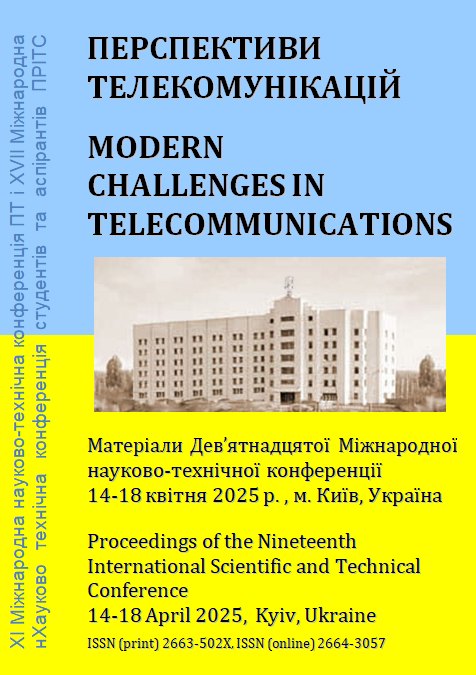МЕТОДИ ПІДВИЩЕННЯ ЕФЕКТИВНОСТІ ОБРОБКИ RZ - СИГНАЛІВ НА ФОНІ НЕГАУСОВИХ ЗАВАД В ІНФОРМАЦІЙНО-ВИМІРЮВАЛЬНИХ СИСТЕМАХ (ІВС)
Ключові слова:
RZ - СИГНАЛ, ЗАВАДА, ІВС, ЕФЕКТИВНОСТЬ, ОБРОБКА СИГНАЛІВАнотація
У статті розглядається проблема підвищення ефективності систем виявлення біполярних дискретних RZ-сигналів в інформаційно-вимірювальних системах, що працюють в умовах негаусових завад. Запропоновано використовувати моментно-кумулятивний опис випадкових процесів для розробки моментних критеріїв якості при перевірці статистичних гіпотез і поліноміальних правил прийняття рішень. Запропонований підхід дозволяє враховувати параметри негаусових завад, що суттєво підвищує точність обробки сигналів. Встановлено, що використання моментно-кумулятивного представлення сигналів і синтезованих алгоритмів дозволяє знизити ймовірність помилок у системах на фоні негаусівських завад, що підтверджено результатами моделювання із застосуванням ROC-кривих.
Посилання
Mahmoud M. A., Ahmed Nabih Zaki Rashed. Hybrid NRZ/RZ line coding scheme based hybrid FSO/FO dual, Indonesian Journal of Electrical Engineering and Computer Vol. 22, No. 2, May 2021 p. 866-873.
Y.Kunchenko: Polynomial Parameter Estimations of Close to Gaussian Random Variables, Aachen: Shaker Verlag, 2002.
V. Palahin, O. Zorin., Models and methods for RZ-signals distinction in non-Gaussian noise for information-measurement systems, Journal of Electrical Engineering, Vol. 75, No. 5, 2024, pp. 372-382.
##submission.downloads##
Опубліковано
Як цитувати
Номер
Розділ
Ліцензія

Ця робота ліцензується відповідно до Creative Commons Attribution 4.0 International License.
Authors who submit to this conference agree to the following terms:a) Authors retain copyright over their work, while allowing the conference to place this unpublished work under a Creative Commons Attribution License, which allows others to freely access, use, and share the work, with an acknowledgement of the work's authorship and its initial presentation at this conference.
b) Authors are able to waive the terms of the CC license and enter into separate, additional contractual arrangements for the non-exclusive distribution and subsequent publication of this work (e.g., publish a revised version in a journal, post it to an institutional repository or publish it in a book), with an acknowledgement of its initial presentation at this conference.
c) In addition, authors are encouraged to post and share their work online (e.g., in institutional repositories or on their website) at any point before and after the conference.

